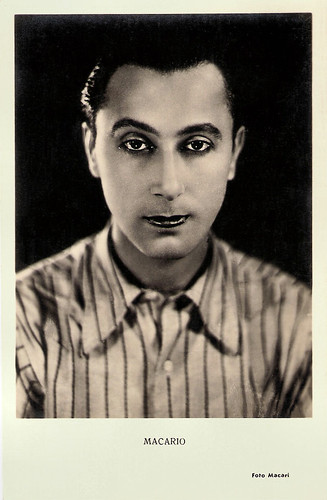
Italian postcard by Bromostampa, Torino, no. 124. Photo: Macari.

Italian postcard by N. Moneta, Milano, no. 124. Photo: Capitani Film / E.N.I.C. Erminio Macario and Carlo Moreno in Il Chiromante/The Fortune Teller (Oreste Biancoli, 1941). The song which Moreno performs is written by Simoinini-Bixio: "O Lolita del mio cuor, voglio un bacio il primo ancor, il secondo vien da sè, non c'è due senza tre". (O Lolita of my heart, I want a kiss the first still, the second comes by itself, there is no two without three).
One of the most popular comedians of the revue theatre
Erminio Macario was born in Turin in 1902, into a very poor and large family. He was the fourth and last child of Giovanni Macario and Albertina Bertimade. He made his stage debut at a young age in the amateur dramatics company Don Bosco Oratory in Valdocco.
In 1920, at the age of 18, he decided to join a company of 'Scavalcamontagne', a Piedmontese village group that performed dramas and farces during fair days, and made his debut on a village stage near Belgioioso, in the province of Pavia. In 1921 he first appeared in prose theatre and, in 1924, in variety theatre, as part of Giovanni Molasso's dance and pantomime company.
In 1925, the famous soubrette Isa Bluette spotted him and engaged him for her company as a 'grotesque comedian'. He debuted in Turin with 'Valigia delle Indie', by Ripp and Bel-Ami (pseudonyms of Luigi Miaglia and Anacleto Francini). Gradually, Macario built his own comedy style with his clownish mask, a tuft of hair on his forehead, rounded eyes and a dangling walk. He realised that the success of a show depended above all on the presence of attractive women on stage. Macario stayed with Isa Bluette for four years, gradually becoming a star. In 1929, he wrote his first revue, 'Paese che vai', in collaboration with Enrico M. Chiappo.
In 1930, he founded his own theatre company, with which he would tour Italy from 1930 to 1965. Except for a few excursions into the avant-garde, his company would remain one of the longest-running revue companies in Italian theatre. In 1937, he cast Wanda Osiris, the undisputed queen of the revue of that time in Italy. She was his partner in the revue 'Piroscafo giallo' by Macario, Ripp and Bel-Ami. In a short time, he became one of the most popular comedians of the revue theatre between the two wars.
Macario made his film debut with Aria di paese/Country Air (Eugenio de Liguoro, 1933). He played an unemployed drifter who takes a series of jobs, each one of which he quickly loses. He then goes to the countryside for a while, where he falls in love with a woman (Laura Adani). His breakthrough came six years later with two comedy films directed by Mario Mattoli and co-written by a young Federico Fellini, Imputato alzatevi!/Defendant, Stand Up! (Mario Mattoli, 1939) and Lo vedi come sei... lo vedi come sei?/Do you see how you are ... do you see how you are? (Mario Mattoli, 1939).

Italian postcard by Ed. Graf. Moneta, Milano, reprint by Ed. Lo Vecchio, Genoa. Image: Dist. ENIC, Roma / Capitani Film. Poster for the comedy Il vagabondo (Carlo Borghesio, Oreste Biancoli, 1941).

Italian postcard by Ed. N. Moneta, Milano. Image: S.A. Produzioni Capitani Film. Distr. E.N.I.C. [Erminio] Macario in the Italian film comedy Il pirata sono io (Mario Mattoli, 1940).
The first Western parody in Italian cinema
Erminio Macario starred in the comedy ll fanciullo del West/The Boy of the West (Giorgio Ferroni, 1943), named after Puccini's opera 'La fanciulla del West' (The Girl of the West). It is considered the first Western parody in Italian cinema.
Then followed a series of successful comedies directed by Carlo Borghesio, including Come persi la guerra/How I Lost the War (Carlo Borghesio, 1947) with Vera Carmi, and Come scopersi l'America/How I Discovered America (Carlo Borghesio, 1949) with Carlo Ninchi and Delia Scala.
Since the early fifties Macario appeared in short characterisations in anthology films and was the sidekick of Totò in such comedies as La cambiale/The Bill (Camillo Mastrocinque, 1959), and Totòsexy/Sexy Toto (Mario Amendola, 1963).
Starting from the mid-sixties he finally focused on television and theatre. One of his last films was the comedy Due sul pianerottolo/Two on the Landing (Mario Amendola, 1976) with Rita Pavone.
During the last repetition of his stage production, 'Oplà, giochiamo insieme', Macario fell ill. The cause turned out to be a tumour. In 1980, Erminio Macario died in a Turin clinic at the age of 77, assisted to the end by his wife Giulia Dardanelli. The funeral took place in the church of San Dalmazzo, and Macario was interred in Turin's monumental cemetery. He and his wife had two children.

Italian postcard, reprint, by Ed. Lo Vecchio, Genoa. Caricature by Nino Za, signed and dated 1951.

Italian postcard by Gevaert.

Italian postcard by Rotalfoto, Milano, no. 316. Photo: Locchi.
Sources: Wikipedia (English and Italian), and IMDb.
This post was last updated on 19 April 2025.
No comments:
Post a Comment